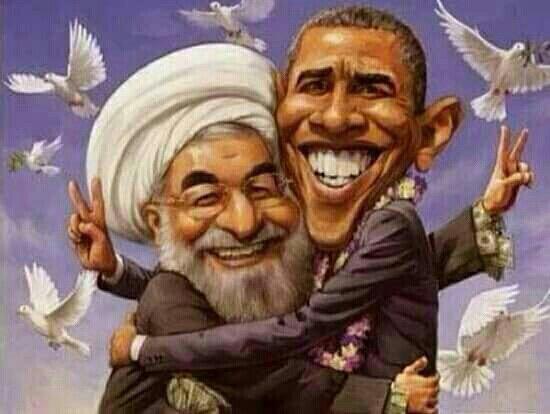Obama’s Mideast Legacy Is One of Tragic Failure
Alan M. Dershowitz/Gatestone Institute/January /17
The Middle East is a more dangerous place after eight years of the Obama presidency than it was before. The eight disastrous Obama years follow eight disastrous George W. Bush years, during which that part of the world became more dangerous as well. So have many other international hot spots.
In sum, the past 16 years have seen major foreign policy blunders all over the world, and most especially in the area between Libya and Iran — that includes Israel, Egypt, Syria, Iraq, Lebanon, Turkey and the Gulf.
With regard to the conflict between Israel and the Palestinians, the Obama policies have made the prospects for a compromise peace more difficult to achieve. When Israel felt that America had its back — under both Presidents Clinton and George W. Bush — they offered generous proposals to end settlements and occupation in nearly all of the West Bank.
Tragically the Palestinian leadership — first under Yasser Arafat and then under Mahmoud Abbas — did not accept either offers from Israel Prime Minister Ehud Barak and Clinton in 2000-2001, nor Prime Minister Ehud Olmert’s offer in 2008. Now they are ignoring current Prime Minister Benjamin Netanyahu’s open offer to negotiate with no preconditions.
In his brilliant book chronicling American-Israeli relationship, Doomed To Succeed, Dennis Ross proves conclusively that whenever the Israeli government has confidence in America’s backing, it has been more willing to make generous compromise offers than when it has reason to doubt American support.
Obama did not understand this crucial reality. Instead of having Israel’s back, he repeatedly stabbed Israel in the back, beginning with his one-sided Cairo speech near the beginning of his tenure, continuing with his failure to enforce the red line on chemical weapons use by Syria, then allowing a sunset provision to be included in the Iran deal, and culminating in his refusal to veto the one-sided UN Security Council resolution, which placed the lion’s share of blame on the Israelis for the current stalemate.
Obama’s one-sided Cairo speech, on June 4, 2009, took place before a large number of Islamic sheikhs and members of the Muslim Brotherhood. (Image source: White House)
These ill-advised actions — especially the Security Council resolution — have disincentivized the Palestinian leadership from accepting Netanyahu’s offer to sit down and negotiation a compromise peace. They have been falsely led to believe that they can achieve statehood through the United Nations, or by other means that do not require compromise.
The Iran deal, while it delayed Iran’s acquisition of nuclear weapons, virtually guaranteed that it would be allowed to develop a nuclear arsenal as soon as the major restrictions on the deal expire in the next decade. Israel will never allow a regime sworn to the destruction of the nation-state of the Jewish people to secure such a weapon.
So the likelihood of an eventual dangerous military confrontation has been increased, rather than decreased, by the poorly negotiated Iran deal.
Obama’s failure to carry out his red-line threat against the Syrian regime’s use of chemical weapons has weakened American credibility among its allies and adversaries alike. It has created a power vacuum that Russia was quick to fill. Turkey, too, has flexed its bullying muscles, as its irascible and egomaniacal leader has used the excuse of the Islamic State in Iraq and Syria (ISIS) to go after another American ally, the Kurds, who have at least as strong a claim to statehood as the Palestinians.
America’s traditional allies in the Middle East — Israel, Egypt, Saudi Arabia, the United Arab Emirates and Jordan — have all been weakened by Obama’s policies, most especially the Iran deal. America’s traditional enemies — Iran, Syria and Hezbollah — have been strengthened, along with Turkey.
Terrorism has increased and moved northward to Europe, partly as a result of the Syrian crisis. ISIS, al Qaeda, the Taliban and other terrorist offshoots, though weakened, remain a serious threat to regional stability and to civilians.
A destabilized Middle East poses increasing dangers to American allies and to peace. The blame for this instability is shared by Presidents George W. Bush and Obama. The invasion of Iraq and the overthrow of Saddam Hussein divided that country, rendering it ungovernable, and invited Iran to play a major role in its current destabilized condition.
The toppling of Moammar Gadhafi left Libya open to increasing terrorist influences. The attempt to replace Bashar Assad has turned Syria into a nightmare.
The forced resignation of Hosni Mubarak initially placed Egypt under the control of the Muslim Brotherhood, and strengthened Hamas in the Gaza Strip. Only a coup, opposed by the Obama administration, restored some semblance of stability to Egypt.
Lebanon has become a wholly-owned subsidiary of Hezbollah, a terrorist group under the influence of Iran that has 100,000 missiles aimed at Israel’s population centers. The “Shiite arc” now runs from Iran through parts of Iraq and Syria and into Lebanon.
This is the tragic legacy of the Obama administration’s failed efforts to undo the harms caused by the George W. Bush administration. Radical Islamic terrorists have replaced authoritarian secular tyrants.
Both are bad, but tyrants at least produce a degree of stability and predictability. They also tend to keep their tyranny domestic, whereas terrorists tend to export their evil tactics.
We should have learned the lesson from the replacement of the tyrannical Shah of Iran by the far more tyrannical and dangerous ayatollahs. But we did not. We insisted on supporting the “democracy” of the Arab spring, which resulted in the replacement of undemocratic domestic tyrants by undemocratic international terrorists.
History will look kindly on Obama’s domestic successes, but it will judge his mideast policy harshly.
Alan M. Dershowitz is professor emeritus at the Harvard Law School and author of “Taking the Stand: My Life in the Law” and “Electile Dysfunction: A Guide for Unaroused Voters.”























